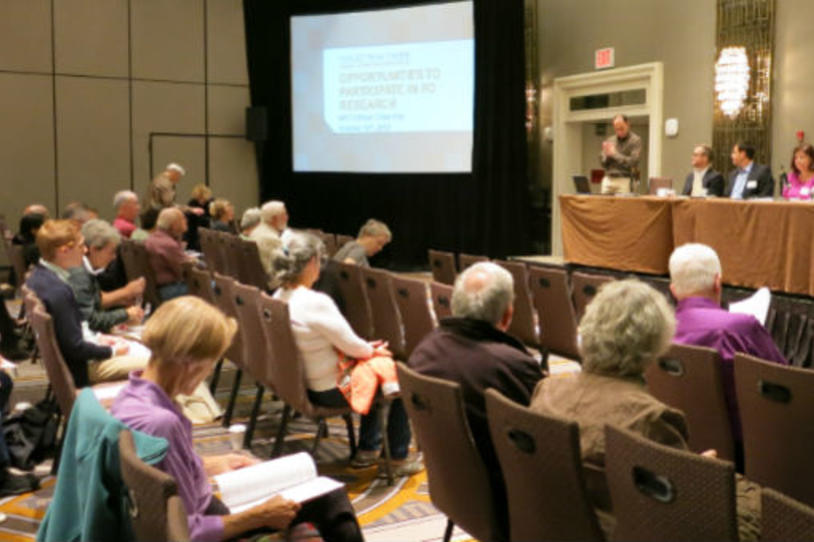
Our CEO Todd Sherer, PhD, led a discussion and q-and-a session at one of the Foundation's many Parkinson's patient community events.
Science begins by asking questions and then finding answers. In Parkinson’s research, the biggest questions are often posed by the patients themselves.
The MJFF research team members frequently engage in dialog with their scientific peers. But a growing number of the team’s speaking engagements, many sponsored by the Foundation, are geared specifically toward the Parkinson’s patient community. Our scientists agree that these events offer unique insight into patients’ concerns, which help develop MJFF’s research strategy.
“Patients have specific priorities,” says Research Programs Senior Vice President Mark Frasier, PhD, who recently spoke at a patient event in Cincinnati. “They’ll ask us about diet and nutrition. They’re curious about deep brain stimulation or the latest in research. All of which are very important questions for us to answer.”
Most MJFF-sponsored events will begin with scientists covering basic questions: What is Parkinson’s? What causes Parkinson’s? How are we trying to stop this disease? These general overviews are followed by an open forum, where the patients are encouraged to ask questions of their own.
“Many of the patients are extremely well-informed about the science,” says Kuldip Dave, PhD, director of Research Programs. “I recently spoke at a research roundtable in Rochester, and the patients asked the same types of questions we ask: ‘Tell us about the AFFiRiS vaccine. When will this be available, and how often should this be taken?’ and ‘How can we image alpha-synuclein?’”
It was during one such discussion, Dr. Dave says, that an opportunity arose. “Patients began asking me how they can participate in the Foundation’s alpha-synuclein imaging consortium,” he says. This opened the door to another series of questions: how can patients can get directly involved in the Foundation’s mission of finding a cure?
“I tell them, ‘Volunteer for research!” says Katie Kopil, PhD, senior associate director. “It can be as simple as wearing a monitoring device that tracks gait and movement issues. It can just be answering a survey online with Fox Insight.”
Some patients may not know that their non-patient family members and friends can participate in research as well. “The need for controls is often new to the patients,” Dr. Kopil says, “even though it’s one thing we take for granted as scientists. I think this is critical information for the patients to have.”
Visit the MJFF In Your Area page to learn of MJFF educational events around the country. Or join our email list to be notified when we’re coming to your area.